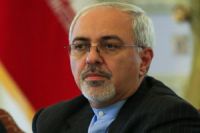 Iranian Foreign Minister Mohammad Javad Zarif says the US Treasury’s blacklisting of entities transacting with the Islamic Republic is a “major setback” for the implementation of the groundbreaking November nuclear deal between Iran and the six world powers.
Iranian Foreign Minister Mohammad Javad Zarif says the US Treasury’s blacklisting of entities transacting with the Islamic Republic is a “major setback” for the implementation of the groundbreaking November nuclear deal between Iran and the six world powers.
According to Iran Review website, Zarif said “It means that they have taken action that would question their intention to resolve this issue through negotiations and that is a major setback.”
“I believe that the actions that had been taken have been unhelpful by the US Treasury Department,” Zarif said.
“It shows a lack of understanding of how to proceed in order to resolve the nuclear issue,” the Iranian minister said, adding that ramping up pressure on Iran will not produce results because Iran developed 18,000 centrifuges under pressure.
“So if they want to continue that road – it is open to them, but it doesn’t produce any results,” he stated.
Zarif said “failed policies and approaches” must be abandoned as “the international community and Iran have decided to move forward with a path towards resolution of this issue.”
“If the US Congress adopts new sanctions- or the US administration, through executive order, decides to impose new sanctions, it would run counter to the letter of the Geneva agreement and that would mean that we don’t have a deal, because the deal has been violated,” said Zarif.
Tehran is determined to reach a final agreement with the six major world powers, resolve the nuclear dispute, and allay any reasonable concerns about its nuclear energy program, Iranian Foreign Minister Mohammad Javad Zarif said.
“The West must also show its seriousness by taking proper steps and adopting a constructive approach,” Zarif said.
Zarif further dismissed as “wrong” the Western assumption that sanctions and pressure are the cause of Iran’s continuing insistence on interaction with the West, adding that the Iranian nation is inclined toward “interaction with the world based on mutual respect.”
“While the Iranian people bear no enmity or hostility toward the West, they have a deep suspicion and distrust of the West,” Zarif said, adding, “Continuation of pressure, sanctions, or unfair treatment will only further deepen the Iranian nation’s suspicion and distrust and will result in irreparable consequences.”
If the West succeeds in winning the Iranian nation’s confidence, Zarif emphasized, “a bright outlook for constructive cooperation and interaction” based on common interests will open up in all fields.
The Iranian minister further criticized some incorrect stances in the West calling for the continuation of unconstructive pressure and sanctions as a result of one-sided interpretations of the recent nuclear deal inked between Tehran and the six powers in Geneva.
“The negotiations and the text of the Geneva deal between the two sides explicitly emphasize the importance of balance and simultaneity in reciprocal measures,” Zarif pointed out.
The Iranian foreign minister also said the most significant diplomatic achievement of the country’s new administration is the collapse of the Iranophobia campaign conducted by the enemies of Iran.
Every day the Israelis come up with a new lie and a new plan to increase Iranophobia, Mohammad Javad Zarif said, discussing the activities of Iran’s Foreign Ministry since the new administration took office.
The Israelis were conducting a massive project to sully the image of Iran, but the entire plan failed in just a few months, he added.
Zarif said the preliminary nuclear deal between Iran and the five permanent members of the UN Security Council – Russia, China, France, Britain and the US -- plus Germany is the main symbol of the collapse of the Iranophobia campaign.
“The Islamic republic will continue the path…, because we believe that our nuclear program is completely peaceful and those who have created threats are the threats themselves,” Zarif added.
Iran’s top diplomat noted that nearly 70 percent of US citizens believe that the dispute over Iran’s nuclear energy program can be solved through negotiations, but the White House is under pressure from hawkish internal groups, which are trying to derail the negotiations.

















